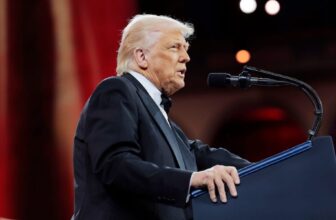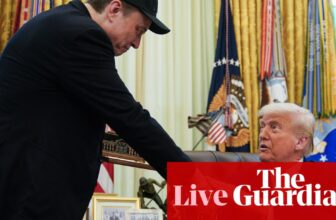
Take a look at our newest merchandise
The US greenback is among the largest losers of ‘Liberation Day’
The sell-off within the US greenback is accelerating, dragging the buck right down to a brand new six-month low.
The greenback is sliding towards rival currrencies, pulling the greenback index right down to its lowest degree since October.
The US greenback has turned out to be one of many largest losers of ‘Liberation Day’, says Daniela Sabin Hathorn, senior market analyst at Capital.com.
The underside line is that uncertainty stays excessive — even with out contemplating that a few of these new tariffs is likely to be cancelled or revised after just a few days of negotiations. Tough estimates counsel the financial impression may very well be even higher than the Smoot-Hawley tariffs of the Nineteen Thirties – a set of protectionist commerce insurance policies that raised import taxes and are extensively believed to have worsened the Nice Melancholy by triggering world retaliation and slowing worldwide commerce [see earlier post for more details].
This isn’t nearly attempting to steadiness commerce — it’s extra just like the U.S. is attempting to grow to be fully self-reliant. The U.S. is trying to provide and devour all the things internally as a substitute of counting on world commerce. At this degree of tariffs, the U.S. would mainly isolate itself economically, chopping off many of the relations with different international locations. It’s onerous to think about this being an enchancment to the present scenario.
Key occasions
The pound has now gained virtually two cents towards the ailing US greenback, and is approaching $1.32 for the primary time since final October.
Deutsche Financial institution: threat of greenback confidence disaster
Oooh. Deutsche Financial institution at the moment are warning shoppers to “beware a greenback confidence disaster”.
George Saravelos, Deutsche’s head of FX Analysis, fears that confidence within the US greenback, and America’s economic system, is being undermined
It is a well timed warning, because the US greenback has sunk by 1.7% up to now in the present day because it weakens sharply towards different currencies.
Saravelos writes:
The secure haven properties of the greenback are being eroded and that is imposing a big value on unhedged greenback holdings. Past that, developments for the reason that begin of the 12 months make us apprehensive a few broader undermining of confidence within the US financial outlook and the medium-term desirability of greenback allocations.
Saravelos says this dangers “a self-fulfilling unwind” of utmost US asset chubby positions from international locations which have exported capital to the US over the past decade.
Many of the developed world belongs to this class. On the finish of the day, the US has a big present account deficit, and the foreign money is reliant on capital inflows for stability. A drop within the greenback, a drop in US equities and an increase in time period premium in US treasuries can be the strongest market sign {that a} technique of US disinvestment is accelerating. An increase in time period premia on US treasuries has not materialized but, however it might be a really unfavorable sign if it did.
Our total message is that there’s a threat that main shifts in capital stream allocations take over from foreign money fundamentals and that FX strikes grow to be disorderly. We might warning that if the greenback decline accelerates, it might be a extremely unwelcome growth for world central banks. The very last thing the ECB desires is an externally imposed disinflationary shock from a loss in greenback confidence and a pointy appreciation within the euro on prime of tariffs. Anticipate pushback. We’re within the midst of dramatic regime change in markets.
Saxo: heightened threat of recession
Markets have been caught off guard by the severity of Trump’s tariffs, stories. Jacob Falkencrone, world head of funding technique at funding platform Saxo.
He flags there are rising fears that the commerce battle may result in stagflation (rising costs however no development) or a recession.
“Whereas Trump claims the transfer will invigorate US manufacturing, many economists warn of potential unfavorable impacts on the economic system. The tariff offensive marks a big financial turning level. With the US now implementing what quantities to the steepest commerce boundaries in a century, the dangers are extra than simply theoretical—they’re seen in actual time, and they’re mounting.”
“The speedy concern is the US economic system, the place the typical efficient tariff price is leaping almost 19 proportion factors. That’s a direct tax on consumption and company prices, particularly for industries counting on imported supplies. The outcome? Increased costs, tighter margins, weaker development—and a heightened threat of recession. Economists warn that these tariffs may speed up the arrival of stagflation, the place inflation rises even because the economic system stagnates or contracts.”
“Globally, the image is simply as regarding. China may lose as much as 2.4 proportion factors of GDP development, in line with current forecasts, and the ripple results may hit Europe, Asia, and rising markets onerous. This isn’t only a US-centric downside—it’s a possible world slowdown within the making.”
The US greenback is being harm by fears that Donald Trump’s commerce battle may drive America’s economic system right into a recession, says Raffi Boyadjian, lead market analyst at XM:
Worries in regards to the financial penalties of Trump’s choices had been additionally mirrored within the US greenback, because the foreign money slid on recession fears.
Traders upped their bets of Fed price cuts to 80 foundation factors, absolutely pricing in three 25-bps reductions for the 12 months.
The US greenback is among the largest losers of ‘Liberation Day’
The sell-off within the US greenback is accelerating, dragging the buck right down to a brand new six-month low.
The greenback is sliding towards rival currrencies, pulling the greenback index right down to its lowest degree since October.
The US greenback has turned out to be one of many largest losers of ‘Liberation Day’, says Daniela Sabin Hathorn, senior market analyst at Capital.com.
The underside line is that uncertainty stays excessive — even with out contemplating that a few of these new tariffs is likely to be cancelled or revised after just a few days of negotiations. Tough estimates counsel the financial impression may very well be even higher than the Smoot-Hawley tariffs of the Nineteen Thirties – a set of protectionist commerce insurance policies that raised import taxes and are extensively believed to have worsened the Nice Melancholy by triggering world retaliation and slowing worldwide commerce [see earlier post for more details].
This isn’t nearly attempting to steadiness commerce — it’s extra just like the U.S. is attempting to grow to be fully self-reliant. The U.S. is trying to provide and devour all the things internally as a substitute of counting on world commerce. At this degree of tariffs, the U.S. would mainly isolate itself economically, chopping off many of the relations with different international locations. It’s onerous to think about this being an enchancment to the present scenario.
UK higher positioned to face up to tariff turmoil, say T. Rowe Worth
The UK economic system will carry out higher than Europe this 12 months, because the commerce battle drags the eurozone into recession, Tomasz Wieladek, chief European economist at T. Rowe Worth, has predicted.
Wieladek predicts the UK will see an increase in cheaper imports, as items producers look to keep away from US tariffs:
The UK will likely be least affected by the brand new insurance policies. I imagine the general unfavorable impact on the UK economic system will solely be about 0.2-0.5% this 12 months. That is primarily as a result of commerce diversion to the US through the UK is prone to be now important. Vegetation producing something within the UK will likely be extra aggressive than within the EU, which is able to help some home funding.
The UK is a commerce deficit nation, and President Trump has simply created important extra capability internationally. UK households will now profit from less expensive items, elevating disposable revenue. Most significantly, the UK authorities applied a big fiscal stimulus package deal six months in the past, simply in time to soak up the tariff hit.
Regardless of the headwinds, the UK will do higher in 2025 than the EU. A gentle recession within the euro space in 2025 is now possible. The ECB will minimize charges beneath the impartial price to 1-1.5%.
German economic system minister Robert Habeck has instructed that US president Donald Trump will buckle underneath strain from Germany and Europe as his commerce battle escalates.
Habeck instructed a information convention:
“That’s what I see, that Donald Trump buckles underneath strain, corrects his bulletins underneath strain, however the logical consequence is that he should additionally really feel the strain, and this strain should now be exerted from Germany, from Europe.”
Wall Avenue’s ‘concern gauge’ has jumped sharply, an indication that there will likely be extra volatility on the US inventory markets.
The VIX index has jumped by round 19%, which Reuters says places it on observe for its largest one-day acquire since late January.
The Saxo Technique Crew say:
S&P 500 and Nasdaq futures dropped over 3% in a single day, driving a surge in demand for cover. At present’s volatility will hinge on reactions from main economies just like the EU, China, and Japan.
Sam Jones
The Spanish Wine Federation (FEV) has described Trump’s imposition of a 20% tariff on EU merchandise as a “important blow to Spanish wineries”, for whom the US is the second largest export vacation spot, and the No 1 export vacation spot on the subject of glowing wines.
The FEV’s director normal, José Luis Benítez, mentioned in the present day:
“The tariffs introduced by the US are fully unjustified within the particular case of wine, contemplating that the present tariff hole between the tariffs utilized by the EU and the US is minimal.”
Benítez warned that the measure would hurt not solely Spanish wine-makers but in addition US shoppers, “who devour extra wine than they produce”.
He additionally identified that the newly introduced tariffs can be significantly damaging to small and medium-sized producers, which make up 99% of Spain’s wineries, as they’ve much less capability to diversify their exports and are extra depending on the principle export markets.
The US market represents roughly 13% of Spain’s complete overseas gross sales. In 2024, 97 million litres of wine had been exported for a price of round €390m.
Japan ‘dissatisfied’ to not escape Trump tariffs
Japanese prime minister Shigeru Ishiba has mentioned he’s disappinted to not win an exemption from President Donald Trump’s new tariffs.
Ishiba additionally promised measures to assist home trade cope with the fallout fromm the brand new 24% tariff which the US is imposing on imports from Japan.
Ishiba instructed reporters:
“We had been requesting that the U.S. authorities evaluate its unilateral tariff measures at varied ranges and we’re extraordinarily dissatisfied and remorse that such measures have been applied nonetheless.”
He added that he’ll converse with president Trump as and when applicable, saying:
“We’ll proceed to strongly urge the U.S. to evaluate its measures.”
Bond yields fall as buyers concern recession
Whereas shares are sliding in the present day, there’s an enormous rally into authorities bonds.
The costs of US Treasury payments, UK gilts, German bunds, and different eurozone authorities debt are all rallying in the present day.
That is flattening bond yields (the speed of return on the debt), with 10-year UK gilt yields down 6 foundation factors at 4.581%.
That may, superficially, sound like excellent news for finance ministers, because it exhibits new borrowing will likely be cheaper.
The issue, although, is that bond costs are rising/yields are falling as buyers concern the worldwide commerce battle will result in a world recession, prompring rate of interest cuts.
Kathleen Brooks, analysis director at XTB, says US commerce coverage has thrown “a grenade into the worldwide economic system”.
Brooks explains:
The bond market is an enormous winner.
Yields are falling sharply in every single place. The UK and European 2-year yields are decrease, because the market rushes to cost in price cuts from the ECB and the BOE, as central banks are prone to step as much as ease a few of the ache from the US’s new world commerce coverage. 10-year yields are additionally decrease, for instance the 10-year Gilt yield within the UK is down 6bps up to now on Thursday.
The UK yield curve is flattening, which is an indication that bond buyers are pricing within the probability of a recession. US yields are additionally decrease, however not by the identical quantity as Europe, suggesting that bond buyers may very well be apprehensive in regards to the inflationary impression on the US economic system.
US tariff calculations elevate “critical issues about coverage credibility”
There’s some shock this morning that the White Home seems to have used a quite blunt device to calculate its new reciprocal tariffs.
Final night time, Donald Trump brandished a board exhibiting (he claimed) the tariffs which different international locations had been charging on the US. The brand new US tariffs have been set at half that price.
Nonetheless, quite than in-depth calculations, US officers have invented a system primarily based on the dimensions of every nation’s commerce surplus.
Mainly, the White Home has taken the US’s items commerce deficit with every nation after which divided it by the entire quantity of products imported from that nation.
[and then halved it, to get the new US tariff for each country, with a 10% minimum].
Deutsche Financial institution have crunched the numbers, and make sure:
Put merely, the larger the nominal commerce deficit a rustic has with the US adjusted for absolutely the dimension of that nation’s imports, the larger the tariff.
The BBC’s Faisal Islam has posted the system:
THREAD:
The so-called “reciprocal” tariff doesn’t replicate the tariffs charged elsewhere instantly however primarily the dimensions of a rustic’s commerce surplus, which has been used as a proxy. The equation primarily is geared toward levying a charge that may get this surplus to zero. pic.twitter.com/ixft2c1RLj
— Faisal Islam (@faisalislam) April 3, 2025
Deutsche Financial institution say this strategy to calculating the tariffs “raises critical issues about coverage credibility, undermining the USD [the dollar].”
They draw three conclusions:
First, the US administration is squarely targeted on penalizing international locations with bigger commerce deficits in items (companies are ignored). This willpower is very mechanical, quite than a classy evaluation of tariff and non-tariff boundaries. It is usually consistent with the declaration of a nationwide emergency on the commerce deficit used as a authorized justification for the tariffs.
Second, there’s a very massive disconnect between communication in current weeks of an in-depth coverage evaluation of bilateral commerce relationships with completely different international locations versus the fact of the coverage consequence. We fear this dangers reducing the coverage credibility of the administration on a forward-looking foundation. The market could query the extent to which a sufficiently structured planning course of for main financial choices is happening. In spite of everything, that is the largest commerce coverage shift from the US in a century. Crucially, main extra fiscal choices are lining up over the subsequent two months.
Third, the tariff calculation strategy arguably makes for a extra free-wheeling and open-ended nature to potential commerce negotiations in coming months. It appears there aren’t any particular and identifiable coverage asks per se however finally a need to cut back bilateral commerce imbalances.
Scottish whisky and salmon industries “dissatisfied” by Trump tariffs

Severin Carrell
The Scottish whisky and salmon industries are “dissatisfied” with President Trump’s determination to impose 10% tariffs on British imports however have backed Keir Starmer’s efforts to win concessions from the US.
The Scotch Whisky Affiliation mentioned:
“The trade is dissatisfied that Scotch whisky may very well be impacted by these tariffs. We welcome the intensive efforts by the UK authorities to succeed in a cope with the US administration, and we proceed to help this measured and pragmatic strategy in the direction of a mutually helpful decision.”
Tavish Scott, chief govt of Salmon Scotland, mentioned:
“We have now nice confidence that Individuals will proceed to purchase nutritious Scottish salmon, significantly when the nation is reliant on imports to satisfy US shopper demand.
“Salmon producers need a business-like and secure commerce relationship with the USA, so we help the UK authorities’s efforts to realize that consequence by a relaxed and measured strategy.”
Each sectors rely very closely on US gross sales, significantly on the luxurious finish of their markets. The US is their second largest overseas buyer. Business our bodies had been briefed by UK authorities officers that Trump’s tariffs on the UK may hit 20% so are prone to be relieved they had been half that.
Scotland exports round £4bn value of products to the US, with whisky almost 1 / 4 of that commerce at £971m final 12 months. The US additionally purchased £225m value of Scottish salmon, which is the UK’s largest world meals export by worth, in 2024.
The tariffs will hit US companies which depend on whisky and salmon. Kentucky bourbon makers promote their used barrels to Scotland for malt whisky maturation, so a fall in gross sales may hit that. Excessive finish US eating places use premium Scottish salmon, airfreighted in from the UK.
US tariff burden may very well be greater than underneath Smoot-Hawley
Economists have calculated that the US tariffs would hit their highest degree in over a century if the measures introduced by Donald Trump final night time are applied in full.
Capital Economics have calcualted that the efficient tariff price on all imports will rise from 2.3% final 12 months to round 26%, leaving it at a 131-year excessive, when you add the brand new reciprocal tariffs to the sooner hikes on items from China, and the product-specific tariffs on metal, aluminum and autos.
They instructed shoppers:
Stepping again, the principle message from President Trump’s “Liberation Day” announcement was that US tariffs had been elevated by greater than even we had anticipated. Since election day, now we have constructed our forecasts on an assumed that the US would impose a tariff of 60% on imports from China and 10% on imports from all different international locations. That may take the efficient US tariff price to round 17%.
As a substitute, the system of reciprocal tariffs that was introduced, along with the extra product-specific tariffs that seem imminent, will take the efficient US tariff price to only underneath 25%.
That, in line with this chart from Capital Economics, would take the efficient tariff price greater than underneath the notorious Smoot-Hawley Tariff Act of 1930.
The Smoot-Hawley Tariff Act was introduced in early within the Nice Melancholy, as a protectionist measure to assist US firms. However it’s typically accepted it worsened the hunch, which adopted the Nice Crash of 1929, by weakening world commerce.
As Dr Eric Golson, Affiliate Professor of Economics on the College of Surrey, lately defined:
Historical past has proven that commerce wars include long-term financial ache. The Nice Melancholy was exacerbated by a global tariff battle, with world commerce plummeting by 66% between 1929 and 1933, crippling American companies and driving unemployment to catastrophic ranges.
UBS have additionally calculated that the“US weighted common import tariff is again to pre-WW I ranges”.
They instructed shoppers:
Combining all of the tariffs, we imagine the weighted common tariff for the US has elevated to 24%, from simply 2.5% firstly of the 12 months, a 21.5pp enhance, and equal to a $715bn enhance in greenback phrases.
Israeli finance minister Bezalel Smotrich has mentioned he’s convening ministry officers to formulate a plan of action to guard Israel’s economic system within the wake of President Donald Trump’s determination to impose tariffs on exports.
As a part of a sweeping new tariff coverage, Israeli items exports to the US will likely be topic to a 17% tariff.
Smotrich mentioned he would talk about with ministry officers, after talking with financial leaders, how one can “analyse alternatives and dangers and formulate programs of motion, each in relation to President Trump and his staff and relating to the mandatory steps to strengthen Israel’s trade”.
Pharma’s tariff reprieve may very well be non permanent
Prescribed drugs firms are avoiding the sell-off this morning, after avoiding the tariffs introduced final night time.
The actual fact sheet issued by the White Home final night time explains:
-
Some items won’t be topic to the Reciprocal Tariff. These embody: (1) articles topic to 50 USC 1702(b); (2) metal/aluminum articles and autos/auto components already topic to Part 232 tariffs; (3) copper, prescribed drugs, semiconductors, and lumber articles; (4) all articles that will grow to be topic to future Part 232 tariffs; (5) bullion; and (6) vitality and different sure minerals that aren’t obtainable in the US.
That has prompted a small reduction rally; in London, GSK are up 1.5% whereas AstraZeneca has risen by 0.6%. Switzerland’s Novartis has gained 0.65%.
However this may very well be short-lived, as Trump would possibly but announce extra sector-specific tariffs.
As Bloomberg explains:
The president is trying into launching a so-called 232 investigation into prescribed drugs and different sectors, together with semiconductors and doubtlessly crucial minerals, in line with a senior administration official. That motion may result in tariffs underneath the Commerce Enlargement Act, because it already has for vehicles and aluminum.
Rate of interest cuts look extra doubtless
Metropolis buyers are ratcheting up bets on rate of interest cuts by main central banks, as policymakers attempt to fend off a world recession.
The cash markets at the moment are pricing in a 92% probability that the European Central Financial institution cuts eurozone rates of interest at its assembly later this month, up from 80% on Wednesday.
The probabilities of a Financial institution of England price minimize in early Could have additionally risen, to 77%.
Customary Chartered, the Asia-Pacific targeted lender, are the largest faller on the FTSE 100 this morning, down 7.5%
That replicate issues that components of Asia has been hit significantly onerous by Trump’s new traade levies.
As ING analysts instructed shoppers:
President Trump’s punitive tariffs hit Asia, with largest levies on Vietnam and smaller textile exporters. The most important economies within the area, reminiscent of India, Japan, and South Korea, fared higher.
General, draw back dangers to development and inflation may speed up financial coverage easing and add to depreciation pressures on currencies.
European markets be part of the rout
European shares have joined the worldwide sell-off with gusto.
The pan-European Stoxx 600 index has fallen 1.5% firstly of buying and selling, to its lowest degree in over two months.
Germany’s DAX fell virtually 2.5% firstly of tading in Frankfurt, whereas in Paris the CAC 40 is down 2.2% and Spain’s IBEX misplaced 1.5%.
Roman Ziruk, senior market analyst at world monetary companies agency Ebury, says:
“Trump’s “Liberation Day” bulletins landed on the very unfavorable finish of market expectations, with the typical tariff price rising to over 20% from simply 2.5% earlier than Trump took workplace, the best degree for the reason that early twentieth century.
“Asian international locations had been hit the toughest, with some seeing punishing reciprocal tariffs of over 40% and China being hit with a large 34% levy on prime of the 20% already imposed for the reason that begin of Trump’s second time period.
“On the opposite aspect of the spectrum are the UK and main Latin American international locations, which had been slapped with at most a ten% obligation, with the EU within the center at 20%.

![[Windows 11 Pro]HP 15 15.6″ FHD Business Laptop Computer, Quad Core Intel i5-1135G7 (Beats i7-1065G7), 16GB RAM, 512GB PCIe SSD, Numeric Keypad, Wi-Fi 6, Bluetooth 4.2, Type-C, Webcam, HDMI, w/Battery](https://m.media-amazon.com/images/I/71LYTzK2A8L._AC_SL1500_.jpg)



![[UPDATED 2.0] Phone mount and holder compatible with Samsung Z Fold 2 3 4 5 6 Pixel Fold or Foldable phone | bicycle, treadmill, handlebar, elliptical, stroller, rail, handle, roundbar, golf cart](https://m.media-amazon.com/images/I/51CjGlidGRL._SL1023_.jpg)








